She’s got no braids in the inkwell, no money on the prize.
Ain’t got no boyfriend behind her that she can’t hypnotize.
And if you wanna see yourself without delusions or delies.
All you do is just look into her eyes.
Narcisissma, Narcisissma has no pride or delusions,
Delusions, delusions make me turn my face
But Narcisissma let’s me find my place.
She’s got no grudges, no crutches, no pigment and no peeves.
No cryers, no pliers, no liars and no sleeves.
And she will always tell you every thing that she believes.
She’s got no belly button too, no high heeled shoe.
Narcisissma, Narcisissma is the pride of Pomona,
Pomona, Pomona says she looks like me.
But she will look like you when I’m set free.
Well everybody’s lookin’ like they’re s’posed to
But nobody’s lookin’ very good.
So when you find somebody to get close to
Well don’t you think you should?
Narcisissma, Narcisissma loves to thrill and delight me,
Delight me, delight me and I’ll never quit
‘Cause Narcisissma knows just where I fit. ( Don Mclean, Narcissisma )
”There were two problems with this new stress on feeling. The first was that the demands of altruism could and did become oppressive for many Victorians. Duty in fact, began to overwhelm love. The thought that one might possess selfish motives drove many to despair and melancholy. The price of altruistic progress could become too heavy. When added to repression in the area of sex, we have the makings of the famous Victorian ethos. Victims of it became fit subjects to enter the consulting chambers of a Viennese doctor, Sigmund Freud. ( Bruce Mazlish )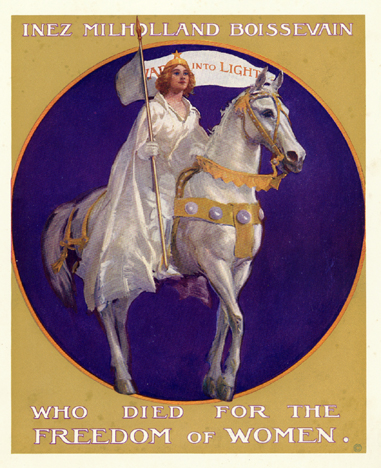
John Stuart Mill’s own awareness of what had happened in his articles of 1831, collectively entitled ”The Spirit of the Age” , which marked a new identity for him, as he struggled mightily to crawl out of the shadow of his father James Mill; a father who gave much to his son, but could not let him go. Mill published this work anonymously. Here John Stuart illustrates how developments in identity and ideology go hand in hand. and together, make up generational change. ”The first of the leading peculiarities of the present age is, that it is an age of transition. Mankind have outgrown old institutions and old doctrines, and have not yet acquired new ones. When we say outgrown, we intend to prejudge nothing. A man may not be either better or happier at six-and-twenty, than he was at six years of age: but the same jacket which fitted him then, will not fit him now.”
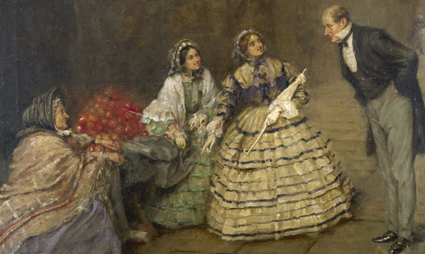
''The painting above depicts the presentation of the first suffrage petition by Emily Davies and Elizabeth Garrett Anderson to John Stuart Mill in Westminster Hall. Mill was a supporter of women’s suffrage, and used the petition in parliament to move for the amendment of the 1832 Reform Act, which restricted women’s right to vote. Parliament rejected the petition, but campaigners for women’s suffrage continued their fight.'' Bertha Newcombe artist.
In tailoring his own jacket, so to speak, John Stuart still kept to the patterns of his father. He continued to be a utilitarian to the end of his days. Nevertheless, he made a number of significant changes in the received doctrine. For one thing, John Stuart moved from his father’s intransigent espousal of laissez-faire economics to a mild tolerance of socialist notions. James Mill had announced that ”If a man preaches this doctrine ( socialism) without seeing what it is, he is below being treated with argument; if he preaches it, knowing what it is, hanging a thousand time would be too small a punishment”. Joh
uart, in later editions of his ”Principles of Political Economy” , came to hold the view that ”We are too ignorant either of what individual agency ( laissez-faire economics) in its best form, or Socialism in its best form, can accomplish, to be qualified to decide which of the two will be the ultimate form of human society.”
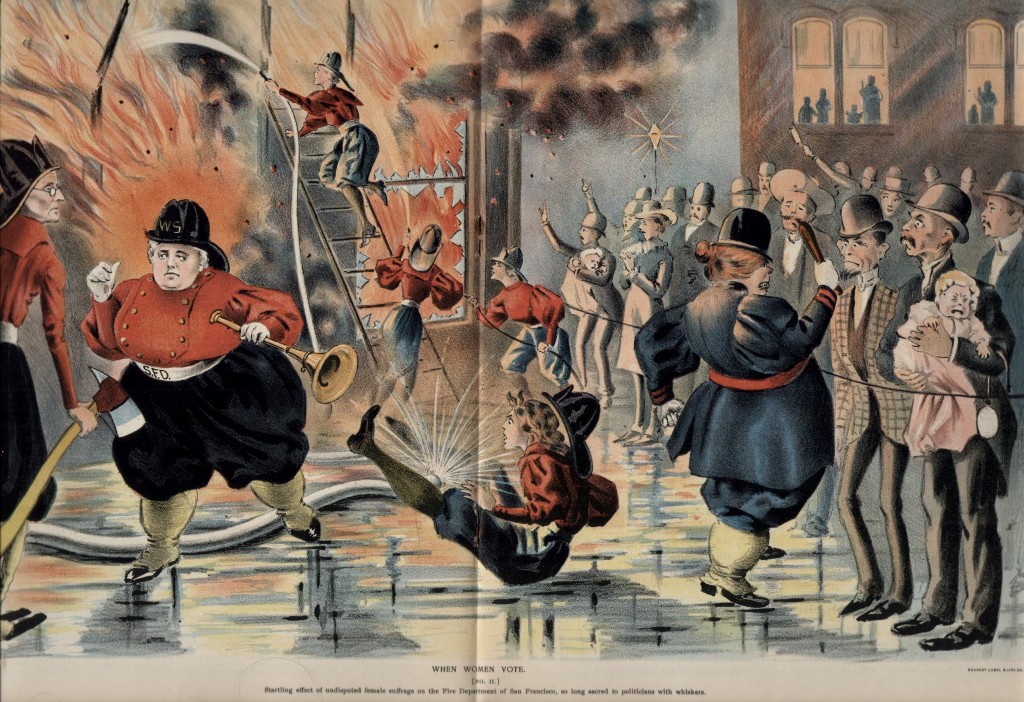
''And even relegating men to the woman’s role. Note below, the men holding babies, and being kept behind the rope by a police woman, while a women’s fire brigade do the work of fire fighting, in this centerspread cartoon published in San Francisco’s Wasp magazine, on May 23, 1896, titled When Women Vote.''
Both father and son, were groping with a form of liberalism that by nature, in the promotion of human behavior within a model of rational choices, was bound to miss the instinctual and emotional side the romantic movement was awakening; a populism that would appropriate aspects of liberalist theory and glue these to the lauded and valorized notions of unchained feelings and unleashed instincts.Another Seemingly innocuous theoretical laboratory experiment became a wild genie that escaped the bottle. John Stuart was up to something fraught with far greater peril than a simple refutation of Jeremy Bentham’s notions on liberty. He was partly responsible for the invention of the social sciences. Today, he might be appalled at the swarm of ideological terrors winging out of this Pandora’s box. He turned the key in a magic box and everyone from Marx to freud to Betty Friedan has been prying off the lid ever since. Its unclear how Mill would react if he was called the patron saint of feminism.
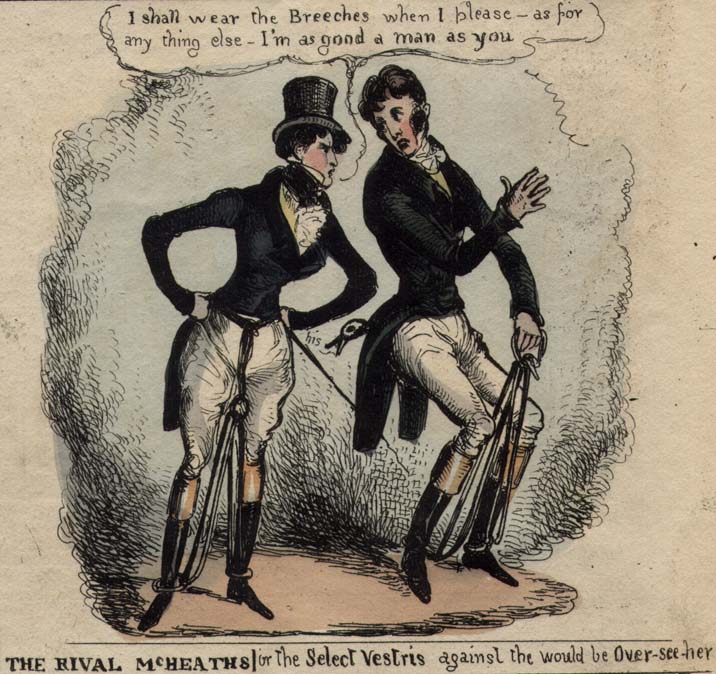
''...this early example, by William Heath, from May 1st, 1830, Volume 1, issue 5, page 3, of The Looking Glass. ''
John Stuart’s acceptance of dependency wishes reflected, most likely, his views on women. Although he was unable to deal with his feelings toward his own mother and sisters, John Stuart could ”love” women in a general and abstract way without feeling threatened in his independence as a man by their equality. The position here is obviously complicated and problematic, but one has the feeling that the price John Stuart paid for treating women as equals was, unfortunately, to ”desex” them. This he seems to have done with Harriet Taylor, and it is perhaps what Freud had in mind when he accused John Stuart of not being able to make the distinction between men and women. Whatever the emotional underpinnings, however, we can say surely that John Stuart extended the equalitarian aspects of utilitarianism to women, transcending thereby his father’s limitations. Freud on John Stuart Mill: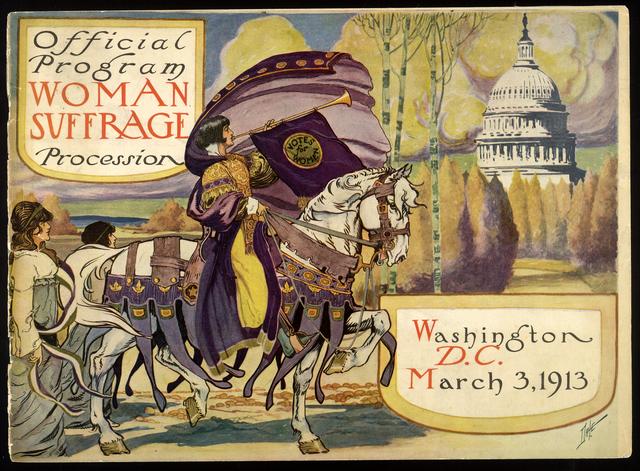
“He was perhaps the man of the century who best managed to free himself from the domination of customary prejudices. On the other hand – and that always goes together with it – he lacked in many matters the sense of the absurd; for example, in that of female emancipation and in the woman’s question altogether. …His autobiography is so prudish… that one could never gather from it that human beings consist of men and women and that this distinction is the most significant one that exists. In his whole presentation it never emerges that women are different beings – we will not say lesser, rather the opposite – from men. He finds the suppression of women an analogy to that of Negroes. Any girl.. whose hand a man kisses and for whose love he is prepared to dare all, could have set him right… ” ( Freud, The Dissolution of the Oedipus Complex )
John Stuart also went beyond his father by integrating feelings and intellect, though the evidence on whether he did this successfully in his life is not very convincing. It is clear however, that he achieved tis integration in terms of doctrine. The cold, unfeeling utilitarian of the early ideology gave way to the philosophical radical ( the new term for utilitarian ) of heart and mind, to imaginative pleasure and rational happiness combined. Poetry could take its place next to political economy.
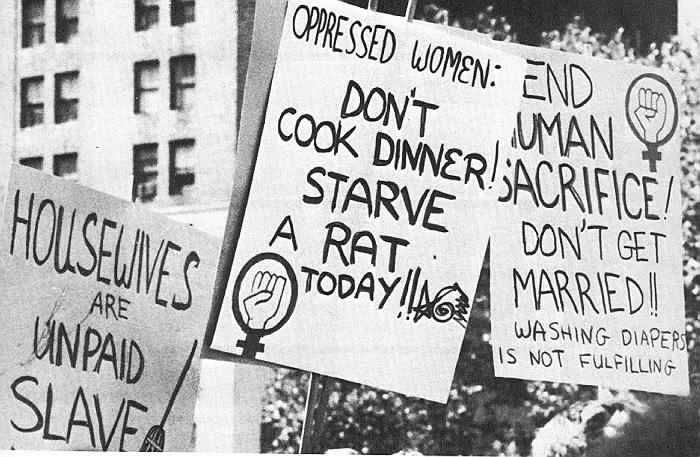
march NYC. 1970. ''"Are you Betty Friedan?" I asked. She gazed at me and nodded "yes", yet I still could not believe it was her. Here was a legend, a super hero, not a person who eats her lunch at a deli on a cold winter afternoon. My gut instinct was just to help her. She had helped me and millions of other women by pioneering the National Women's Movement. ''
”But even before Freud, a German philosopher had pointed out the other danger to liberalism from re-awakened feelings. The discovery of Nietszchean instinctual desires was deeply disturbing to the belief in reasoned feelings underpinning the liberal ideology. It was not that middle class elite thinkers had not previously been aware of the irrationality and primitive urges of the masses. But, like both Mills, they thought the lower classes could be uplifted and guided to reason, once emancipated from tyrannical authority. Now, that faith was shaken. Worse, as first Nietzsche and then Freud pointed out, reason was not even the master in one’s own middle-class, house”…
”… In our time we have seen how liberty has become confused with liberation. Mills ”On Liberty” replaced by Marcuse’s ”On Liberation”. Even in Mill’s cherished women’s movement, one part of women’s liberation, with its frequently inchoate longings and group spirit, has threatened to replace what Mill would have regarded as proper liberty. Where altruism once prevailed, with all its problems, now narcissism, with all its indulgences, pretends to become the public philosophy.”



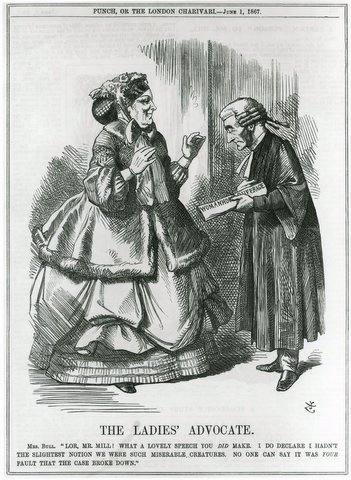





 COMMENTS
COMMENTS




I really enjoyed this, Dave, especially because I recently re-read the chapter on Mill and Taylor in Phyllis Rose’s book Parallel Lives. And, as always, you’ve found wonderful illustrations.
Thanks so much for reading. Mill is certainly an underrated and key figure who continues to color our view of ourselves in terms of identity and the world at large. He was playing with some powerful forces, that I don’t think he totally foresaw the potential for their reach. Best,
Dave